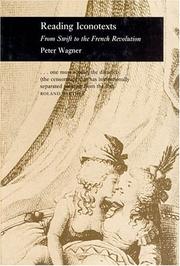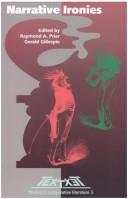| Listing 1 - 6 of 6 |
Sort by
|
Book
Year: 1950 Publisher: Paris : Presses universitaires de France,
Abstract | Keywords | Export | Availability | Bookmark
 Loading...
Loading...Choose an application
- Reference Manager
- EndNote
- RefWorks (Direct export to RefWorks)
Conscience. --- Ironie (rhétorique). --- ironie.
Book
Year: 1950 Publisher: Paris : Presses universitaires de France,
Abstract | Keywords | Export | Availability | Bookmark
 Loading...
Loading...Choose an application
- Reference Manager
- EndNote
- RefWorks (Direct export to RefWorks)
Conscience. --- Ironie (rhétorique). --- ironie.
Book
Year: 1964 Publisher: München : Carl Hanser,
Abstract | Keywords | Export | Availability | Bookmark
 Loading...
Loading...Choose an application
- Reference Manager
- EndNote
- RefWorks (Direct export to RefWorks)
Mann, Thomas (1875-1955) --- Ironie (rhétorique) --- Humour --- Dans la littérature --- Dans la littérature
Book
ISBN: 2200212534 9782200212537 Year: 1993 Publisher: Paris : Colin,
Abstract | Keywords | Export | Availability | Bookmark
 Loading...
Loading...Choose an application
- Reference Manager
- EndNote
- RefWorks (Direct export to RefWorks)
D'ailleurs le but des justifications n'est pas de s'approcher de la " vérité " : les justifications poursuivent une quantité de buts particuliers, mais il n'y a pas un but supérieur aux autres et qui serait " la recherche de la vérité ", car cette recherche devrait de toute façon se faire par le biais du langage : on retombe donc dans la contingence propre à tout langage." Il existerait une justification ultime ", précise Rorty dans L'espoir au lieu du savoir, " si et seulement s'il s'agissait d'une justification devant dieu ou devant le tribunal de la raison " Dans son livre Contingence, ironie et solidarité, Richard Rorty développe les acquis du pragmatisme, du moins tel qu'il conçoit celui-ci, jusqu'à leurs conséquences ultimes. Considérant qu'on ne peut transcender le langage dans ou par le langage et que par conséquent on ne peut donner du monde et de sa soi-disant réalité que des interprétations médiées et limitées par les ressources langagières, il en vient à la conclusion que les notions de vérité, d'universalisme, d'objectivité ne sont que des métaphores qui servent à exprimer une vision du monde parmi d'autres, mais qui n'ont en soi aucune valeur indépendante de leur contexte de naissance. Rorty remet en cause toute position extérieure à la communauté linguistique d'appartenance qui permettrait de conserver à la vérité quelque transcendance que ce soit. Il remet donc en cause tout réalisme, qu'il assimile à des restes de platonisme." Il n'y a rien en dehors du langage, sinon du langage, lequel n'a de comptes à rendre qu'à lui-même." Rorty se refuse à faire un saut dans l'objectivité et réduit strictement la vérité à l'assertabilité garantie. Le vrai n'est rien d'autre que ce qui peut être justifié au sein d'une communauté particulière. Il n'est donc pas question d'envisager comme Habermas une quelconque communauté idéale qui serait l'horizon commun de procédures argumentatives, ni même une forme de rationalité qui dépasserait les frontières particulières en direction d'une communauté universelle.
Philosophy of language --- Political philosophy. Social philosophy --- Philosophy --- Philosophie --- Langage et langues --- Philosophie. --- Contingence --- Ironie --- Langage et langues - Philosophie. --- idéologie --- littérature --- Libéralisme (philosophie). --- Solidarité. --- Ironie (rhétorique). --- Philosophie du langage. --- Idéologie. --- Libéralisme. --- Philosophie sociale. --- Littérature. --- Morale. --- politique. --- Libéralisme --- Morale --- Politique.

ISBN: 9780948462719 094846271X Year: 1995 Publisher: London : Reaktion Books,
Abstract | Keywords | Export | Availability | Bookmark
 Loading...
Loading...Choose an application
- Reference Manager
- EndNote
- RefWorks (Direct export to RefWorks)
Traditionally, texts and images have been discussed together on the assumption that they are 'sister arts', but in Reading Iconotexts Peter Wagner pushes beyond the word-image opposition in a radical attempt to break down the barriers between literature and art. He sets out here the new approach he has identified for dealing with the 'iconotext' - a genre in which neither image nor text is free from the other. Examples include Swift's Gulliver's Travels, a number of William Hogarth's best-known engravings, and a sample of the so-called 'obscene' propaganda prints that were published during the French Revolution. Throughout, the author argues for the importance of seeing text and image as mutually interdependent in the ways they establish meaning. It becomes clear in the course of Wagner's exposition that one cannot study prints without taking into account their accompanying inscriptions; whilst illustrated books contain two kinds of 'text' - one verbal, one visual - that are invariably at odds with one another. Drawing on theories of intertextuality and semiotics as developed by Barthes and Kristeva, as well as post-structuralist studies by Derrida, Foucault and others, Reading Iconotexts treats pictures as encoded visual discourse and illustrations in books as counter-discourse. The author's persuasively argued polemic in favour of recognising the 'iconotext' as a viable advance in methodology is an important contribution to current debates on word and image.
Art and literature. --- Iconografie. --- Tekstinterpretatie. --- Prenten. --- Illustration --- Semantik --- Geschichte 1726-1790. --- Bildergeschichte --- Literatur --- Geschichte 1700-1789. --- Ironie (rhétorique) --- Dessin --- Gravure --- Illustration des livres --- Dans la littérature. --- Dans l'art. --- Hogarth, William --- Hogarth, William, --- Englisch --- Illustration. --- Semantik. --- Bildergeschichte. --- Literatur. --- Hogarth, William. --- Englisch.

Abstract | Keywords | Export | Availability | Bookmark
 Loading...
Loading...Choose an application
- Reference Manager
- EndNote
- RefWorks (Direct export to RefWorks)
This volume focuses on the flourishing of irony as a primary characteristic of the great era of European narrative sophistication from the Goethezeit to Modernism. Its eighteenth essays explore varieties of ironic consciousness associated with texts especially of northern Europe, and the ways they established a dialogue with and on literature and culture at large. As the volume shows, this interrogation of Europe's self-awareness of cultural identity bound up in reading and writing habits gained a new post-Cervantine complexity in Romanticism and has been of lasting significance for literary theory down to postmodernism. By its comparativistic framing of the issues raised by ironic consciousness, Narrative Ironies duly serves as a Festschrift honoring Lilian R. Furst. Among major writers treated are Sterne, Goethe, Godwin, Schlegel, Hoffmann, Poe, Stendhal, Kierkegaard, Disraeli, Keller, Maupassant, Zola, Huysmans, Wilde, Tolstoi, Hofmannsthal, Strindberg, Proust, Mann, Musil, Kafka, Joyce, Faulkner, and Szczypiorski... Back cover.
82-7 --- Fiction --- -Irony in literature. --- Metafiction --- Novellas (Short novels) --- Novels --- Stories --- Literature --- Novelists --- 82-7 Humor. Satire --- Humor. Satire --- History and criticism --- Philosophy --- Irony in literature. --- Ironie dans la littérature --- Ironie dans la littérature --- Literary semiotics --- Roman --- History and criticism. --- Histoire et critique --- 82-7 Prose satire. Humour, epigram, parody etc. --- Prose satire. Humour, epigram, parody etc. --- -Irony in literature --- Fiction. --- Verteltheorie. --- Ironie (rhétorique) --- Dans la littérature. --- Histoire et critique.
| Listing 1 - 6 of 6 |
Sort by
|

 Search
Search Feedback
Feedback About
About Help
Help News
News